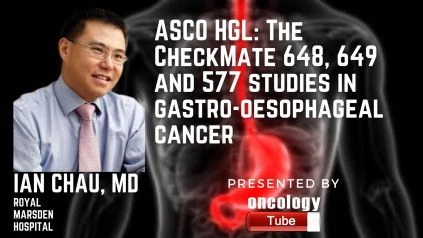Ian Chau, MD, Consultant Medical Oncologist, The Royal Marsden NHS Foundation Trust speaks about The CheckMate 648, 649, and 577 Studies In Gastro-oesophageal Cancer.
The Phase 3 CheckMate -648 trial found that two Opdivo-based treatment combinations — Opdivo (nivolumab) plus chemotherapy and Opdivo plus Yervoy (ipilimumab) — had a statistically significant and clinically meaningful overall survival (OS) benefit compared to chemotherapy at the pre-specified interim analysis in patients with unresectable advanced or metastatic esophageal squamous cell carcinoma. In this scenario, Opdivo + Yervoy is the first dual immunotherapy combination to show a better survival benefit than chemotherapy. Presented at the 2021 American Society of Clinical Oncology (ASCO) Annual Meeting in an oral session on Saturday, June 5, 2021, and included in the official press program.
In patients whose tumors express PD-L1, median OS was 15.4 months vs. 9.1 months for chemotherapy (hazard ratio [HR] 0.54, 99.5 percent CI: 0.37-0.80, p0.0001), and 13.2 months vs. 10.7 months in the all-randomized patient population (HR 0.74, 99.1 percent CI: 0.58-0.96, p=0.0021) for the Opdivo plus chemotherapy combination. In patients whose tumors express PD-L1, Opdivo with chemotherapy resulted in a statistically significant improvement in progression-free survival (PFS), with a median PFS of 6.9 months compared to 4.4 months with chemotherapy alone (HR 0.65, 98.5 percent CI: 0.46-0.92, p=0.0023).
In patients whose tumors express PD-L1, the median OS was 13.7 months vs. 9.1 months for chemotherapy, a primary endpoint (HR 0.64, 98.6 percent CI: 0.46-0.90, p=0.001), and 12.8 months vs. 10.7 months in the all-randomized patient population, a secondary endpoint (HR 0.78, 98.2 percent CI: 0.62-0.98, p=0.011). In patients whose tumors express PD-L1 (4.0 months vs. 4.4 months; HR 1.02, 98.5 percent CI: 0.73-1.43, p=0.8958), Opdivo with Yervoy did not meet its other main objective of PFS by BICR (4.0 months vs. 4.4 months; HR 1.02, 98.5 percent CI: 0.73-1.43, p=0.8958).
Opdivo with chemotherapy and Opdivo plus Yervoy had similar safety profiles to those previously described for other tumor types. The Opdivo plus chemotherapy group had 47 percent grade 3/4 drug-related adverse events, 32 percent in the Opdivo plus Yervoy arm, and 36 percent in the chemotherapy arm. The all-randomized data was consistent with the safety profile in individuals with PD-L1 1%.
In patients whose tumors express PD-L1, the median duration of response (DoR) per BICR was 8.4 months for Opdivo plus chemotherapy, 11.8 months with Opdivo plus Yervoy, and 5.7 months for chemotherapy alone, and 8.2 months, 11.1, and 7.1 months in the all-randomized population, respectively.
The combination of Opdivo with chemotherapy resulted in a clinically significant increase in the objective response rate (ORR). In patients whose tumors express PD-L1, the ORR per BICR was 53 percent for Opdivo plus chemotherapy, 35 percent for Opdivo plus Yervoy, and 20 percent for chemotherapy alone, and 47 percent, 28 percent, and 27 percent, respectively, in the all-randomized population.
CheckMate –648 is the first worldwide Phase 3 trial in advanced ESCC to investigate both immunotherapy and chemotherapy, as well as a dual immunotherapy combination.

